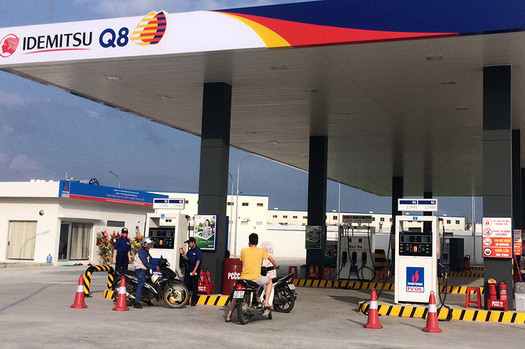The Japanese will change the Vietnamese gasoline market.
Opening the first store selling gasoline with accuracy to 0.01 liter, Idemitsu Q8 from Japan marked a dot on a journey to redraw the gasoline map; and giants like Petrolimex with 2,700 stores in prime locations must also be wary.
According to its commitment to the World Trade Organization, Vietnam has not opened its doors to foreign businesses to set up retail gasoline systems.But by investing in a domestic refinery, Idemitsu emerged with many new conveniences and quality commitments for consumers.
When Idemitsu Q8's petroleum distribution chain is formed, the petroleum distribution market will be competitive.
However, in the early stages, foreign-invested enterprises (FDI) could not "overtake" domestic companies with wide distribution channels such as Petrolimex or PVOil... For example, Petrolimex has 2,500 - 2,700 gas stations in good locations across the country.
But Idemitsu's application of automatic management software that allows card payments, and its commitment to managing fuel volume with an accuracy of up to 0.01 liter... will be a "breath of fresh air" for many consumers.
 |
| Idemitsu's first petrol retail store in Hanoi. |
Idemitsu joined the Nghi Son Refinery and Petrochemical project to gain the right to trade petroleum in the domestic market. With Idemitsu Q8’s experience in Japan and the fact that FDI enterprises own 75% of the investment capital in Nghi Son Refinery and Petrochemical, the above plant has a special mechanism.
That is a huge advantage for Idemitsu Q8 to establish a large-scale gasoline retail system.
However, at present, we cannot talk about competition in retail gasoline prices because the base price is still decided by the State, and businesses must retail gasoline around the base price.
That means the current retail price of gasoline is actually a price regulated by the State, not decided by the market.
As long as the State still decides the basic price of gasoline, even if FDI enterprises come in, they cannot compete equally.
If in the future the petrol business mechanism allows competition in retail prices, the petrol stations themselves will decide the retail price of petrol.
At that time, even petrol retail stores of the same company could retail at different prices to capture the market.
Currently, businesses importing, distributing, and retailing gasoline only compete on fees, meaning that gasoline prices are basically unchanged, with only slight differences in business costs.
But if operating according to market principles, businesses must compete on retail prices and sales services. Only when businesses are allowed to decide on retail gasoline prices will there be truly fierce competition in the gasoline market.
If FDI enterprises hold and dominate the petroleum market in the future, there will be a possibility that the state will lose control of the market.
Petroleum is a strategic commodity that affects everyone, so the State must maintain the market through mechanisms and technical barriers. It is impossible to open the door to the petroleum market.
According to Tien Phong Newspaper
| RELATED NEWS |
|---|

